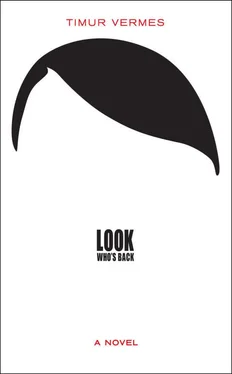“What do you mean?” Madame Bellini asked.
Sawatzki sat forward. “Tall, super-blonde,” he said. “An S.S. type.”
“Not bad, not bad at all,” Madame Bellini said.
“Göring would get more laughs,” Sensenbrink said.
“We don’t want cheap laughs,” Bellini and I said in unison.
We looked at each other. I liked this woman more and more with every meeting.
* * *
“Good evening and welcome,” I said to Frau Künast, offering her a seat. She sat down confidently, like someone accustomed to the camera.
“I’m delighted to be here,” she said mockingly, “sort of.”
“You may well be wondering why I invited you.”
“Because no-one else said yes?”
“Not at all. We could have had your colleague, Frau Roth. Which reminds me, could you do me a favour?”
“That depends.”
“Please expel that woman from your party. How could anybody form an alliance with a party that accommodates something quite so gruesome?”
“Well, that’s never stopped the S.P.D. or the C.D.U. in the past…”
“Indeed; aren’t you a bit surprised?”
For a moment she looked perplexed.
“Just for the record I’d like to say that Claudia Roth makes an indispensable contribution to…”
“Maybe you’re right, perhaps all you need to do is keep her away from the cameras, in a windowless, sound-proofed basement — but now we’ve arrived at the subject I wanted to discuss. I invited you here because I have to plan for the future, of course, and if I understand it correctly I will need a parliamentary majority for a takeover of power…”
“Parliamentary majority?”
“Yes, just as in 1933, when I needed the support of the D.N.V.P. Things might develop in a similar fashion in the foreseeable future. But, alas, the D.N.V.P. no longer exists, so I thought I’d look into potential candidates for a new Harzburg Front…”
“And of all the parties you see the Greens as a substitute?”
“Why ever not?”
“I don’t see many opportunities here,” she said with a frown.
“Your modesty does you great credit, but don’t hide your light under a bushel. Your party is more suitable than you might think.”
“Now I’m curious.”
“It is my assumption that we have compatible visions for the future. Pray tell me, where do you see Germany in five hundred years’ time?”
“Five hundred?”
“Or in three hundred years?”
“I’m no prophet, I prefer to focus on the realities.”
“But surely you have a plan for Germany?”
“Not for three hundred years. Nobody knows where we’ll be in three hundred years.”
“I do.”
“Oh really? Where will we be, then?”
“In devising their plans for the future, ladies and gentlemen, the Greens are seeking advice from the Führer of the German Reich — I did tell you that cooperation is not so inconceivable…”
“You can keep your alliance,” Künast backtracked hastily. “The Greens will get by perfectly well without you…”
“I see. In that case, how far into the future does your planning stretch? One hundred?”
“That’s nonsense!”
“Fifty? Forty? Thirty? Twenty? I know, I’ll count down from twenty and you can say ‘Stop!’”
“In all seriousness, nobody can predict future developments further ahead than, what? Ten years?”
“Ten?”
“O.K. Fifteen.”
“Alright, then. Where do you see Germany in a quarter of an hour?”
Künast sighed.
“If you absolutely insist, in the future I see Germany as an environmentally friendly high-tech country — especially as far as environmental technology is concerned — with a sustainable energy policy, embedded in a peaceful Europe under the umbrella of the E.U. and U.N.…”
“Did you get that, Werner?” I asked my adjutant.
“…embedded in a peaceful Europe under the umbrella of the E.U. and U.N.,” Werner dutifully jotted down.
“But can you be sure there will still be an E.U. by then?” I asked.
“Of course.”
“Will the Greeks still be in it? The Spaniards? The Italians? The Irish? The Portuguese?”
Künast sighed again. “Who can say for certain?”
“But you’re sure about your energy policy! There you are thinking along the same lines as I am! Few or no imports, total autarky from renewable raw materials, water, wind — energy security in one hundred, two hundred, even one thousand years. There you are — you can see into the future after all. And this — how shall I put it? — is precisely what I was always calling for…”
“Hang on one minute! For completely the wrong reasons!”
“What have these reasons got to do with a sustainable energy industry? Are there good and bad windmills?”
She looked at me crossly.
“If I understand you correctly,” I followed up, “for species-appropriate husbandry of dolphins, it is fine to use good, wholesome solar energy, but if you settle Ukrainian farmland with Germanic peasant soldiers, all they get is electricity from lignite? Or atomic energy?”
“No,” Künast protested. “You settle it with Ukrainians. If you settle it at all!”
“May the Ukrainians use wind energy? Or do you have specific ideas about this, too? Do you, in fact, have a directory of the different forms of energy and their correct use?”
She leaned back. “You know perfectly well that’s not what I meant. The way you’re arguing you might just as well ask whether the murder of millions of Jews would have been better with solar energy…”
“Interesting,” I said. “But the Jews are no laughing matter.”
For a moment not a sound was to be heard in the studio.
“Silence on television is a waste of expensive Volk airwaves,” I said. “So in the meantime, let us take a commercial break.”
The lights were dimmed slightly. A few people came and reapplied our make-up. Künast covered her microphone with her hand.
“What you do sails very close to the wind, let me tell you!” she said in a hushed voice.
“Of course I’m very aware of your party’s sensibilities,” I said. “But you cannot deny that you were the one who brought up the Jews.”
She pondered. Then the lights went up again. I waited for the applause to die down, then asked, “Would you mind accompanying me to the map table?”
On the far right of the studio we had reconstructed the old map table from the Wolf’s Lair. I had commissioned a beautiful, large relief map of the world. “Why,” I asked as we strolled over to it, “has your party in recent times been forgoing the experience and knowledge of Fischer, the former minister of war?”
“Joschka Fischer was never minister of defence,” Künast retorted brusquely.
“You’re right,” I agreed. “I never saw him as a minister of defence, either. One can only defend Reich territory, and Kosovo is not an integral part of that. Given how far away it is, an annexation wouldn’t have made any sense either. Or do you think otherwise?”
“There was no question of annexing Kosovo! It was all about ethnic cleansing… Listen, I’m not going to start talking about the intervention in Kosovo. It was simply that we couldn’t turn a blind eye!”
“No-one understands that better than I do,” I said in all seriousness. “You are absolutely right, there was no alternative. This I remember well from 1941. So what is that Fischer fellow up to at the moment, then?”
I could see her eyes oscillating between Herr Fischer’s current circumstances and a comparative study of Balkan policy over the past seventy years. She opted for the former.
“The most important thing is that the Greens have no concerns about the talent in our ranks. Joschka Fischer was and still is an important figure in the history of the Green movement, but now it’s the turn of others.”
Читать дальше












